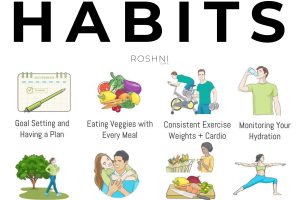Easy Tips to Make Healthy Living a Habit

Importance of Healthy Living
Embracing a healthy lifestyle is more than just a trend; it’s a crucial choice for overall well-being. Healthy living encompasses various aspects such as nutrition, exercise, sleep, and stress management, all of which play a vital role in how one feels each day. For instance, think of someone who struggles with constant fatigue and low mood. By introducing simple changes like balanced meals and regular physical activity, they can experience newfound energy levels and improved mental clarity.
- Easy Tips to Make Healthy Living a Habit
- Importance of Healthy Living
- Benefits of Establishing Healthy Habits
- Setting Realistic Goals
- Identifying Personal Health Goals
- Creating Actionable Plans
- Eating a Balanced Diet
- Understanding Nutritional Needs
- Meal Planning for Optimal Health
- Staying Active
- Finding Exercise Routines You Enjoy
- Incorporating Physical Activity into Daily Life
- Prioritizing Sleep
- Establishing a Bedtime Routine
- Creating a Relaxing Sleep Environment
- Managing Stress
- Recognizing Stress Triggers
- Implementing Stress-Relief Techniques
- Hydration and Its Importance
- Benefits of Drinking Enough Water
- Tips for Staying Hydrated Throughout the Day
- Building a Support System
- Surrounding Yourself with Healthy Influences
- Seeking Professional Help When Needed
- Monitoring Health Metrics
- Regular Health Check-Ups
- Tracking Progress Towards Health Goals
- Establishing Healthy Habits for the Long Term
- Making Sustainable Changes
- Overcoming Challenges and Staying Consistent
Benefits of Establishing Healthy Habits
Establishing healthy habits is the foundation for a happier, more fulfilling life. Here are some key benefits:
- Enhanced Energy: Regular physical activity boosts stamina and combats fatigue.
- Better Mood: Proper nutrition has a direct impact on emotional well-being.
- Improved Sleep: A healthy routine promotes better sleep patterns.
- Stronger Immune System: A balanced diet rich in nutrients strengthens immunity.
By integrating these healthy habits, individuals can embark on a journey towards a more vibrant and rewarding life. Real-world changes may seem daunting, but taking small, consistent steps can lead to lasting transformations.
Setting Realistic Goals
Identifying Personal Health Goals
Once you’ve recognized the importance of healthy living, the next step is to identify personal health goals that resonate with you. It’s essential to choose goals that are specific, measurable, achievable, relevant, and time-bound (SMART). For example, instead of saying, “I want to eat healthier,” a more defined goal could be, “I will eat at least five servings of fruits and vegetables each day for the next month.” Engaging in self-reflection can help uncover what changes resonate most with your lifestyle. Consider aspects such as:
- Weight management
- Increased energy levels
- Enhanced mental clarity
- Better sleep quality
Creating Actionable Plans
With clear health goals in place, the next step is crafting actionable plans. This involves breaking down larger goals into smaller, manageable steps. For instance, if the goal is to exercise three times a week, start by scheduling short workouts, gradually increasing their duration and intensity. Here’s a quick outline to consider:
- Daily Meal Prep: Designate a day for planning and preparing meals.
- Weekly Exercise Schedule: Block out time for workouts in your calendar.
- Sleep Goals: Set a specific bedtime to ensure sufficient rest.
By transforming intentions into structured plans, individuals can pave the way for successful and sustainable health improvements.
Eating a Balanced Diet
Understanding Nutritional Needs
With clear goals and actionable plans in mind, focusing on nutrition is the next critical step towards a healthier lifestyle. Understanding nutritional needs involves recognizing the importance of various food groups, including proteins, carbohydrates, fats, vitamins, and minerals. Think about it: when someone fuels their body with the right nutrients, they feel more energized and focused. Here’s a simple breakdown of essential nutrients:
- Proteins: Crucial for muscle repair and immune function (e.g., chicken, beans)
- Carbohydrates: The body’s go-to energy source (e.g., whole grains, fruits)
- Fats: Important for hormone production and brain function (e.g., avocados, nuts)
Meal Planning for Optimal Health
Once you’ve grasped your nutritional needs, meal planning becomes a powerful tool for success. Planning meals in advance minimizes unhealthy choices and saves time during busy weekdays. Start with these steps:
- Choose a Day for Planning: Dedicate time each week to strategize meals.
- Create a Grocery List: Align it with your planned meals to avoid impulse buys.
- Batch Cooking: Prepare meals in larger quantities to simplify daily cooking.
By adopting a balanced diet and engaging in effective meal planning, individuals can ensure they nourish their bodies properly while enjoying a diverse range of flavors.
Staying Active
Finding Exercise Routines You Enjoy
After laying the groundwork for a balanced diet, it’s essential to prioritize staying active. The first step is discovering exercise routines that resonate with you. It’s no secret that people are more likely to stick with activities they enjoy. Consider trying a variety of options to see what fits best. Some popular choices include:
- Dancing: A fun way to get your heart rate up while expressing yourself.
- Hiking: Connect with nature while breaking a sweat.
- Yoga: Enhance flexibility and mental clarity through mindful movements.
- Team Sports: Engage with friends while enjoying a friendly competition.
Finding your groove can make all the difference!
Incorporating Physical Activity into Daily Life
Once you’ve identified enjoyable routines, the next challenge is incorporating physical activity into your daily life. Here are some practical tips to keep you moving:
- Take the Stairs: Swap the elevator for stairs whenever possible.
- Walk or Bike for Short Trips: Opt for active transportation for nearby errands.
- Schedule Mini Workouts: Set timers for short bursts of activity throughout your day.
By seamlessly integrating enjoyable exercises into your routine, staying active becomes not just a necessity but a joyful part of your lifestyle. Ultimately, cultivating this active mindset further supports your overall health journey.
Prioritizing Sleep
Establishing a Bedtime Routine
As we continue our journey towards a healthier lifestyle, prioritizing sleep is crucial. A consistent bedtime routine lays the groundwork for restful nights and rejuvenating days. Imagine coming home after a long day and transitioning smoothly into sleep mode, rather than jumping straight into bed. A solid routine might include:
- Winding Down: Spend 30 minutes engaging in calming activities like reading or stretching.
- Limiting Screen Time: Avoid screens at least an hour before bed to help your brain unwind.
- Consistent Sleep Schedule: Go to bed and wake up at the same time, even on weekends.
These practices not only signal to your body that it’s time to sleep but also help develop lasting habits.
Creating a Relaxing Sleep Environment
In conjunction with a bedtime routine, creating a relaxing sleep environment can enhance sleep quality. Consider these tweaks for your space:
- Comfortable Bedding: Invest in a good mattress and cozy pillows.
- Optimal Room Temperature: Keep the room cool, around 60-67°F (15-19°C), to encourage better sleep.
- Dark, Quiet Space: Use blackout curtains and white noise machines to eliminate distractions.
By establishing a consistent routine and a soothing environment, individuals can significantly improve their sleep quality, ultimately enriching their overall health and well-being. Restful sleep is a key pillar that supports all other aspects of a healthy lifestyle.
Managing Stress
Recognizing Stress Triggers
Continuing our journey towards a holistic approach to health, managing stress plays a pivotal role in maintaining well-being. The first step in this process is recognizing stress triggers. These triggers can vary widely from person to person, resulting in feelings of overwhelm or anxiety. Common stressors might include:
- Work-related pressures: Tight deadlines or difficult colleague dynamics.
- Personal relationships: Conflicts or unmet expectations from loved ones.
- Financial concerns: Managing bills and unexpected expenses.
By identifying these triggers, individuals can develop awareness that allows them to proactively address stress before it escalates.
Implementing Stress-Relief Techniques
Once stress triggers are recognized, the next step is implementing effective stress-relief techniques. These strategies can be incredibly beneficial for regaining control and promoting emotional health. Consider trying:
- Mindfulness Meditation: Spend a few minutes daily focusing on your breath.
- Physical Activity: Engage in your favorite exercise to release endorphins.
- Journaling: Write down your thoughts to clarify emotions and reduce anxiety.
By actively managing stressors and incorporating these techniques into daily life, individuals can foster a greater sense of calm and resilience, further enhancing their overall health journey. Stress management is not just an option; it is a crucial aspect of living a balanced life.
Hydration and Its Importance
Benefits of Drinking Enough Water
As we enhance our overall health, one essential element often overlooked is hydration. Drinking enough water is vital for maintaining optimal bodily functions and overall well-being. When adequately hydrated, individuals experience numerous benefits that can elevate their daily lives. Some key advantages include:
- Improved Energy Levels: Staying hydrated helps combat fatigue, making tasks feel less daunting.
- Enhanced Concentration: Adequate water intake supports cognitive functions, aiding focus and memory.
- Better Digestion: Water plays a crucial role in maintaining digestive health, preventing constipation.
When people started paying attention to their hydration, many noticed improvements in their mood and energy levels!
Tips for Staying Hydrated Throughout the Day
To ensure you’re drinking enough water daily, consider these practical tips:
- Carry a Water Bottle: Having it within arm’s reach encourages regular sips.
- Set Reminders: Use your phone or apps to remind you to drink water throughout the day.
- Infuse with Flavor: Add slices of fruit or herbs to enhance the taste of plain water.
By embracing proper hydration habits, individuals can unlock the myriad of benefits that come with drinking enough water, supporting their health and wellness journey. Remember, staying hydrated is a simple yet powerful way to enhance overall vitality and well-being.
Building a Support System
Surrounding Yourself with Healthy Influences
As you continue to prioritize hydration and your overall health journey, one of the most impactful steps is building a support system. Surrounding yourself with healthy influences can make a significant difference in maintaining motivation and accountability. Think about it: when you’re in a positive environment, adopting healthy habits becomes more manageable. Here are some ways to cultivate that environment:
- Join a Fitness Group: Engaging with others who share similar goals can increase motivation.
- Connect with Healthy Friends: Spend time with those who inspire you to make better choices.
- Limit Negative Influences: Assess relationships and distance yourself from those who undermine your efforts.
Seeking Professional Help When Needed
While a supportive circle is invaluable, don’t hesitate to seek professional help if necessary. This could include nutritionists, personal trainers, or therapists who can provide tailored guidance and strategies. Consider these steps:
- Consult a Nutritionist: A professional can help you design a balanced meal plan suited to your needs.
- Engage a Personal Trainer: They can create an effective workout regimen, ensuring you stay motivated and safe.
- Therapeutic Support: Speaking with a therapist can provide coping strategies for stress and emotional challenges.
By building a robust support system and knowing when to seek professional assistance, individuals can navigate their health journeys with greater ease and empowerment, further enriching their overall experience.
Monitoring Health Metrics
Regular Health Check-Ups
As you cultivate a supportive environment and make healthy choices, monitoring your health metrics becomes essential. Regular health check-ups are vital for understanding how your lifestyle changes are impacting your body. These check-ups provide valuable insights into any potential health issues before they escalate. Consider scheduling:
- Annual Physicals: These comprehensive exams evaluate overall health and can help detect early signs of illness.
- Routine Blood Tests: Monitoring cholesterol and glucose levels gives a clearer picture of your internal health.
- Specialized Screenings: Depending on your age and risk factors, screenings for conditions such as diabetes or blood pressure might be necessary.
Taking these proactive steps can significantly enhance your health journey.
Tracking Progress Towards Health Goals
In addition to check-ups, actively tracking your progress towards health goals keeps you accountable and motivated. Utilize tools that work best for you, such as:
- Health Apps: Many apps allow you to log food intake, exercise, and hydration.
- Fitness Trackers: Wearable devices can monitor activity levels and sleep patterns.
- Journals: Writing down your experiences helps reflect on changes and celebrate milestones.
By consistently monitoring health metrics, you’ll gain a clearer understanding of your journey—ensuring that your efforts lead to sustainable improvements in your health and overall quality of life.
Establishing Healthy Habits for the Long Term
Making Sustainable Changes
As you monitor your health metrics and track your progress, the ultimate goal is to establish healthy habits that last a lifetime. Making sustainable changes is vital for ensuring these habits become an integral part of your lifestyle rather than a temporary fix. Start by focusing on small, manageable changes:
- Gradual Adjustments: Instead of overhauling your diet overnight, try swapping out one unhealthy snack for something nutritious.
- Flexible Routines: Allow your exercise schedule to adapt to your life rather than sticking to a rigid plan that may cause burnout.
- Celebrate Progress: Acknowledge milestones, no matter how small, to maintain motivation.
Overcoming Challenges and Staying Consistent
Even with the best intentions, challenges will arise. Recognizing this is key to maintaining these habits. Here are strategies to help overcome obstacles:
- Plan for Setbacks: Expect fluctuations in motivation and have a backup plan, like a list of quick workouts for busy days.
- Build Accountability: Partner with a friend who shares similar goals to keep each other motivated.
- Stay Flexible: It’s okay to adjust your goals as life changes. Adaptability is crucial for long-term success.
By making sustainable changes and learning to navigate challenges, individuals can establish healthy habits that not only promote well-being but also enrich their quality of life in the long run. The journey toward health is ongoing, and each step taken is a step toward a more vibrant future.





